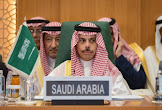US President Donald Trump claimed to have sent a letter to
the Leader of the Islamic Revolution, Ayatollah Seyyed Ali Khamenei, expressing
interest in striking a deal with Iran on its nuclear program – a move that
represents neither a swerve in Iran-US relations nor holds much promise under
the current US policies.
"I wrote them a letter saying I hope you are going to
negotiate," Trump stated, coupling the plea with the familiar threat to
either "handle" Iran militarily or "make a deal." In an
eyebrow-raising moment, when asked when he'd sent the letter to [Imam] "Khomeini,"
the long-deceased founder of the Islamic Republic, Trump claimed it was
"yesterday," meaning Wednesday.
An unnamed
American official, later told Al Jazeera that the letter had been
"written" but not yet sent. That came after Iran’s mission to the UN
said the country had received no such letter.
This isn't the first instance of a US president writing –
or, in this case, claiming to have written – to Iran's Leader. Former President Barack Obama
penned two letters to Ayatollah Khamenei, and Trump himself entrusted former
Japanese Prime Minister Shinzo Abe with a message for the Leader during Abe's
2019 visit to Tehran. Ayatollah Khamenei declined to receive the letter,
telling Abe that he didn't consider Trump a “worthy” interlocutor.
This also isn’t the first instance of Trump saying he wants
a deal with Iran. He's been making this statement since 2018, the year he
withdrew from the Joint Comprehensive Plan of Action (JCPOA).
That 2015 agreement, negotiated over at least two years by
Iran, the United States, Britain, Russia, China, and Germany, traded limits on
Iran's nuclear program for sanctions relief.
Trump's abandonment of the JCPOA and reimposition of
sanctions not only undermined the agreement but ultimately spurred European
nations to enact their own embargoes later, despite remaining official
signatories.
On the same Thursday that Trump told a Fox anchor he wanted
to negotiate with Iran, his Treasury Secretary, Scott Bessent, addressed the
Economic Club of New York.
There, Bessent vowed that the president’s anti-Iran
sanctions during his second term would be even more severe.
“We are
going to shut down Iran’s oil sector and drone manufacturing capabilities,”
Bessent stated, adding that the administration also intends to cut off Tehran’s
access to the international financial system.
Multiple Iranian officials have reiterated in recent weeks
that Iran will not engage in talks under pressure, aligning with a directive
from Ayatollah Khamenei, who in early February described negotiations with the
US as "unwise, unintelligent, and dishonorable."
Iranians’ deep-seated distrust towards the US is rooted in
decades of American meddling in Iran's affairs, especially during the Pahlavi
era. But Ayatollah Khamenei’s stance has especially hardened since Trump withdrew
Washington from the JCPOA.
The
fact that the president continues to threaten Iran with sanctions or military
action is not helping ease Tehran’s concerns either.
During his Fox Business interview, Trump stated his primary
concern was preventing Iran from developing nuclear weapons. However, his
decision to withdraw from the JCPOA – a deal that subjected Iran's nuclear
facilities to unprecedented international scrutiny and compelled the country to
roll back some of its advancements – suggests other priorities are at play.
As a
February directive revealed, Trump's real goals are to force Iran to curtail
its missile programs and sever ties with regional Resistance forces.
Analysts argue that publicizing a letter before it reaches
the intended recipient serves primarily to advance Trump's own interests,
rather than reflecting a genuine desire for good faith diplomacy.
Given Iran's sustained resistance to years of sanctions,
it's clear that propaganda and media maneuvers alone will not compel the
country to negotiate.
Iran also remains firm on its refusal to negotiate its
military capabilities, and persistent or intensified Western pressure may
ultimately force it to reconsider its nuclear doctrine.
There's no guarantee that Trump's potential military options
against Iran would achieve the desired outcome. Washington likely lacks the
capacity to destroy all of Iran's fortified and dispersed nuclear sites, while
a devastating response from Tehran would be all but certain.






